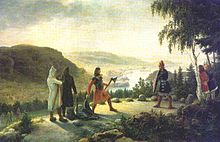Holmgang — Wikipédia

Le holmgang (hólmganga en vieux norrois et en islandais, holmgång en suédois) était une forme médiévale de duel pratiqué à l'époque en Scandinavie. Il s'agissait d'un moyen courant de résoudre les conflits. Le duel se disputait généralement sur une île[1].
Le terme signifie "île" (holm) et "aller" (gang), donc "aller sur une île"[2].
Dans la culture
[modifier | modifier le code]Ce duel est présent dans l'album de Thorgal, Aaricia[3].
Bibliographie
[modifier | modifier le code]- Olav, Bø, "Hólmganga and Einvigi: Scandinavian Forms of the Duel". Medieval Scandinavia 2 (1969) 132-148.
- Jesse Byock, “Hólmganga,” entry in Medieval Scandinavia: An Encyclopedia (ed. Philip Pulsiano, 1993) 289-290.
- Marlene Ciklamini "The Old Icelandic Duel". Scandinavian Studies 35:3 (1963) 175-194.
- Hermann Pálsson and Stefanie Würth, '"Holmgöngur" in der altnordischen Literatur: Historischer Gehalt und literarische Gestaltung', Amsterdamer Beiträge zur Älteren Germanistik, 41 (1995), 37ff.
- Gwyn Jones, "The Religious Elements of the Icelandic ‘Holmganga.’" Mod. Language Rev. 27:3 (1932) 307-313.
- Gwyn Jones, "Some Characteristics of the Icelandic ‘Holmganga.'" J. Eng. & Germanic Philology 32 (1933) 203-224.
- R. SRadford, "Going to the Island: A Legal and Economic Analysis of the Medieval Icelandic Duel". Southern California Law Rev. 62 (1989) 615-44.
Références
[modifier | modifier le code]- (no) « Holmgang » dans le Store norske leksikon
- (en) Aleksa Vučković, « Fight For Your Honor! The Holmgang And Viking Law », sur Ancient Origins Reconstructing the story of humanity's past (consulté le )
- Thorgal-BD, « L’intégrale, volume 3 | Thorgal » (consulté le )


 French
French Deutsch
Deutsch